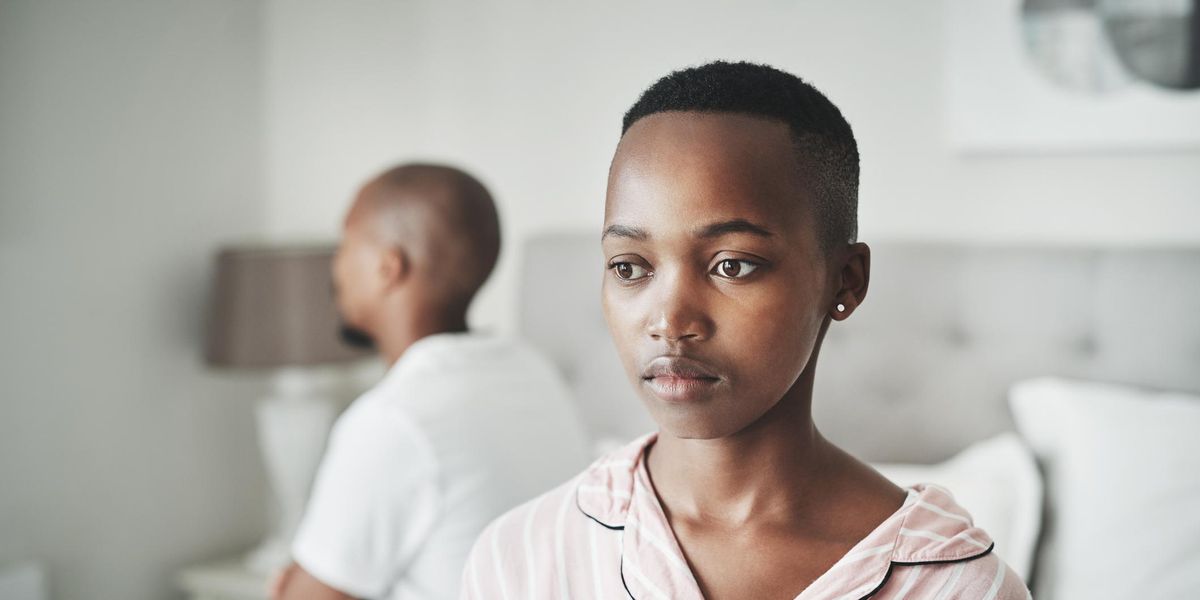
Are You "Sex Shaming" Your Partner?
Not too long ago, while being interviewed, someone asked me how (or maybe they meant why) I was so comfortable talking about sex. More specifically my own sex life. That's kind of a layered answer. One, I'm pretty open, in general. Two, it's been a billion years since I've had sex. And three, when you're a relationship writer, it's kind of par for the course that the more, let's go with the word "authentic", your content is, the easier it is for folks to receive it. Where exactly am I going with this?
Well, in the effort to really drive the point home with this piece, I'm gonna provide you with a bit of a TMI tale. Recently, I watched a video from a YT channel called Cey & Jai (Jai is actually Joycelyn Savage's younger sister, by the way). The channel features a couple who pranks each other from time to time. On this one, Jai is pretending to talk to a friend of hers about Cey having a "shrimp" (talk about triggering somebody and Cey was indeed triggered!). Anyway, it caused me to reflect on a past sex partner and the first time I saw his, uh member.
Y'all, I didn't mean to yet back then, I had far less of a filter than I do now. Anyway, when I looked at it for the first time, the first thing that came out of my mouth was, "So, that's it?" I promise that didn't mean to yet oh, the devastation that was on his face. The real tripped out part is when it comes to vaginal orgasms, I've had the most with him to-date. Moral to the story—sex shaming someone is super foul and two, check out "BDE: Please Let The 'It Needs To Be Huge' Myth Go" sometime. A married friend of mine is quick to say that a big d—k ain't always all that it's cracked up to be.
So, let's talk a little bit about sex shaming, shall we? Personally, I think it's something that doesn't get discussed enough which is fascinating because I deal with couples all of the time who do it to their partner on some level—and it's costing them the kind of great sex that both of them truly deserve.
If you're curious to know if you're someone who is a bit of a sex shamer (or if your partner may be slick sex shaming you), here are a few questions that can help you to get down to the bottom of things, so that you can switch up your behavior. Because if there are two words that should absolutely never go together at the end of the day, it's "sex" and "shame".
Are You Making Comparisons?

I believe I've shared before that there's a couple that I know who were virgins when they got married (yep, both of them). They are going on two decades at this point. Anyway, one time I asked the wife if she's ever wondered if her husband is actually good in bed. She simply responded with, "I mean, he's great to me. I don't have anything else to compare it to." If you're a virgin reading this, that's a great incentive to wait until you meet "your one" because when you've had multiple partners, not—pardon the pun—sizing everyone up is actually pretty difficult to do.
I mean, a part of the reason why I said what I did to ole' boy is because I had already seen quite a few penises that were much larger than his was (check out "14 Lessons I've Learned From 14 Sex Partners" and "Sex Hacks For Different Kinds Of Penises (You Heard Me Right)"). And because, on the onset, I had a bit of a bias, it caused me to assume that just because he wasn't "packin'", he wouldn't be able to provide me with pleasure. That absolutely wasn't the case.
Again, if you've got a sexual past, making comparisons kinda comes with the territory. Still, if you're doing it so much that it hinders you from being open to what your current partner can do to make you happy, low-key, there is some sex shaming happening, for sure.
Do You Nitpick When It Comes to Their Body?

Listen, I'm a woman and I'll still be the first one to say that oftentimes, we are notorious for hypocritical double standards. Let a man "rate us" (like y'all ain't seen a Kevin Samuels YouTube video before) and it's an unforgivable sin. Oh, but we'll be the first in line to say we don't like short men, men with small(er) penises or we'll clown a man if he's got a gut or something else that's not appealing when it comes to our personal likes and preferences. How is that any different?
Is there something wrong with having a type? No, there isn't. Yet the point here is if you want to avoid being a sex shamer (and hopefully, you absolutely do), it's important that you practice the golden rule. If you don't want to feel judged or that your partner is being overly critical about your looks/body, don't be that way towards them.
And what if there is something about them that is a total turn-off like maybe you didn't realize that they are hairier than you can handle or there's some type of hygiene/personal upkeep issue that's going on? First, definitely don't bring it up during the act and secondly, still deliver your thoughts in a way where they can receive it. Be kind. Be considerate. Don't bark directives; make suggestions or requests. No one wants to feel constantly critiqued by their sex partner. The good news about this point is you have control over if this happens or not, a lot more than you initially might think.
Are Your Expectations Unfair or Unrealistic?

I like checking out what YouTube calls "the manosphere". Contrary to the assumption of a lot of women (insert eye roll here), women cannot speak for men—only men can do that. Well, something that several of them have brought up as of late is how a lot of thick women don't seem to date men similar to them. It's like guys get ridiculed if they don't desire a woman of a certain size while those same women ignore men who are larger themselves (that's a checkmate, whether we want to accept it or not).
Personally, I'm not trying to cram any preference down anyone's throat. You like what you like and I'm too beautiful to try and convince you to see me that way. All good. At the same time, though, I do think that we should be realistic when it comes to what we expect from someone. On the looks tip, why would you feel entitled to someone being in better shape than you are? And on the sex tip, it's totally unfair to want a guy to look or act like someone else from your past or to mimic someone who you may be currently fantasizing about. It's also ridiculous to think that every sexual experience is going to be like some sex scene you saw in a movie or music visual. Or like what you experienced with someone prior to your current situation.
Real talk, the best sex isn't even just about the mechanics of the act. It's about having a great chemistry, a good connection and a willingness to learn each other's bodies—including what makes each other tick—together. Expecting stuff to work out perfectly or immediately is about as unrealistic as they come. It can also cause you to put unnecessary pressure onto you as well as your partner. And that could cultivate certain feelings of shame; especially on your partner's end.
Do You Embarrass Them When You Discuss Them with Other People?

Sex is private. It's intimate. And honestly, it's really not anyone else's business. Not the extreme details of it all, anyway. And here's the thing—something that I find to be interesting about both men and women is when they don't really give AF about their partner, they will call up their friends and TELL IT ALL. Oh, but when they truly care about the individual, they seem to have very little to say. Know why? Because they value the person's feelings and the relationship a whole lot more than they do when it comes to some…random.
I talk about sex, pretty much for a living. I know for a fact that some of my past partners couldn't care less if I even mentioned their name (because we've discussed it before). Maybe it's because some of them know that they would receive the highest praise. I dunno. Still, even with as candid as I am about this topic, I'm not out to humiliate anyone.
This is definitely something to think about if you're good for giving play-by-plays with your homies about your sexual encounters. If whatever you're about to say, you know for a fact would embarrass your partner if they were present, maybe rethink bringing that up. Because sometimes shame can boomerang. In this case, I mean you might end up with someone who puts your business out in the streets too. Pretty sure that's not something that you want to ever transpire. Because…see paragraph one of this particular point.
Do You Fake Orgasms?

I know some of y'all are team "faking it". I absolutely am not. I don't know how in the world that anyone can get better in their performance if they already think that they are killin' it because I am lying the entire time. And while this might seem like an odd thing to mention when it comes to sex shaming, here's where I'm going with it. I work with couples where the wife (usually more than the husband) is sho 'nuf faking it. Some of them have been doing it their entire marriage. Others do it in order to rush their partner (because he is the opposite of a minute man, if you know what I mean) or because they aren't really in the mood. Whatever the motivation is, if you do it too long, it can cause you to become resentful and that is what can lead you to start shaming your partner—saying slick ish, making excuses not to have sex, avoiding afterplay so that you can go somewhere else and "handle yours" (again, if you know what I mean).
Besides, while orgasms are awesome (no doubt), sex can still be really good without having one (or several) every single time you engage. If you make sex more about enjoying your partner (as they enjoy you) rather than reaching a climax all of the time, both of you can feel more at ease and that can make orgasms easier to achieve. Full circle.
Are You Freezing Them Out?

You know, it's interesting that some of the synonyms for shame include confusion, irritation, degradation, self-disgust, guilt, contempt and humiliation. And honestly, I think this is the best way to end this particular piece. One of the worst ways to sex shame your partner is to say or do things that would cause them to feel any of the words that I just said—and oftentimes, it's freezing them out (making excuses to not have sex, pushing them away, neglecting their needs on a continual basis) that can cause that to happen.
At the end of the day, sex is a top tier form of communication. And great communicators strive to make the people they're interacting with feel heard and felt. No greater goal should happen in the bedroom, don't you think? Be intentional about affirming your partner. Express your desire for them to do the same for you. It's a surefire way to avoid sex shaming—on so many levels, sis.
Join our xoTribe, an exclusive community dedicated to YOU and your stories and all things xoNecole. Be a part of a growing community of women from all over the world who come together to uplift, inspire, and inform each other on all things related to the glow up.
Featured image by Getty Images
- Do You Lie About Your Body Count? Here's Why You Shouldn't ... ›
- Do You Know the Difference Between Sex and Intimacy? - xoNecole ... ›
- How To Communicate Sexually - xoNecole: Women's Interest, Love, Wellness, Beauty ›
- Penis Size That Gives Women The Most Orgasms - xoNecole: Women's Interest, Love, Wellness, Beauty ›
Different puzzle pieces are creating bigger pictures these days. 2024 will mark a milestone on a few different levels, including the release of my third book next June (yay!).
I am also a Professional Certified Coach. My main mission for attaining that particular goal is to use my formal credentials to help people navigate through the sometimes tumultuous waters, both on and offline, when it comes to information about marriage, sex and relationships that is oftentimes misinformation (because "coach" is a word that gets thrown around a lot, oftentimes quite poorly).
I am also still super devoted to helping to bring life into this world as a doula, marriage life coaching will always be my first love (next to writing, of course), a platform that advocates for good Black men is currently in the works and my keystrokes continue to be devoted to HEALTHY over HAPPY in the areas of holistic intimacy, spiritual evolution, purpose manifestation and self-love...because maturity teaches that it's impossible to be happy all of the time when it comes to reaching goals yet healthy is a choice that can be made on a daily basis (amen?).
If you have any PERSONAL QUESTIONS (please do not contact me with any story pitches; that is an *editorial* need), feel free to reach out at missnosipho@gmail.com. A sistah will certainly do what she can. ;)
ItGirl 100 Honors Black Women Who Create Culture & Put On For Their Cities
As they say, create the change you want to see in this world, besties. That’s why xoNecole linked up with Hyundai for the inaugural ItGirl 100 List, a celebration of 100 Genzennial women who aren’t afraid to pull up their own seats to the table. Across regions and industries, these women embody the essence of discovering self-value through purpose, honey! They're fierce, they’re ultra-creative, and we know they make their cities proud.
VIEW THE FULL ITGIRL 100 LIST HERE.
Don’t forget to also check out the ItGirl Directory, featuring 50 Black-woman-owned marketing and branding agencies, photographers and videographers, publicists, and more.
THE ITGIRL MEMO

I. An ItGirl puts on for her city and masters her self-worth through purpose.
II. An ItGirl celebrates all the things that make her unique.
III. An ItGirl empowers others to become the best versions of themselves.
IV. An ItGirl leads by example, inspiring others through her actions and integrity.
V. An ItGirl paves the way for authenticity and diversity in all aspects of life.
VI. An ItGirl uses the power of her voice to advocate for positive change in the world.
Let’s make things inbox official! Sign up for the xoNecole newsletter for daily love, wellness, career, and exclusive content delivered straight to your inbox.
You've Never Seen Luke James In A Role Quite Like This
Over the years, we've watched Luke James play countless characters we'd deem sex symbols, movie stars, and even his complicated character in Lena Waithe's The Chi. For the first time in his career, the New Orleans-born actor has taken on a role where his signature good looks take a backseat as he transforms into Edmund in Them: The Scare—a mentally deranged character in the second installment of the horror anthology series that you won't be able to take your eyes off.
Trust us, Edmund will literally make you do a double take.
xoNecole sat down with Luke James to talk about his latest series and all the complexity surrounding it—from the challenges taking on this out-of-the-box role to the show's depiction of the perplexing history of the relationship between Black Americans and police. When describing the opportunity to bring Edmund's character to life, Luke was overjoyed to show the audience yet another level of his masterful acting talents.
"It was like bathing in the sun," he said. "I was like, thank you! Another opportunity for me to be great—for me to expand my territory. I'm just elated to be a part of it and to see myself in a different light, something I didn't think I could do." He continued, "There are parts of you that says, 'Go for it because this is what you do.' But then also that's why it's a challenge because you're like, 'um, I don't know if I'm as free as I need to be to be able to do this.' Little Marvin just created such a safe space for me to be able to do this, and I'm grateful for everything I've been able to do to lead to this."

Them: The Scare, like the first season, shines a light on the plight of Black Americans in the United States. This time, the story is taking place in the 1990s, at the height of the Rodney King riots in Los Angeles. While the series presents many underlying themes, one that stands out is Black people and the complicated relationship with the police. "For the audience, I think it sets the tone for the era that we're in and the amount of chaos that's in the air in Los Angeles and around the country from this heinous incident. And I say it just sets the tone of the anxiety and anxiousness that everybody is feeling in their own households."
James has been a longtime advocate against police brutality himself. He has even featured Elijah McClain, the 23-year-old Colorado man who died after being forcibly detained by officers, as his Instagram avatar for the past five years. So, as you can imagine, this script was close to his heart. "Elijah was a soft-loving oddball. Different than anyone but loving and a musical genius. He was just open and wanted to be loved and seen."

Luke continued, "His life was taken from him. I resonate with his spirit and his words...through all the struggle and the pain he still found it in him to say, 'I love you and I forgive you.' And that's who we are as people—to our own detriment sometimes. He's someone I don't want people to forget. I have yet to remove his face from my world because I have yet to let go of his voice, let go of that being [because] there's so many people we have lost in our history that so often get forgotten."
He concluded, "I think that's the importance of such artwork that moves us to think and talk about it. Yes, it's entertaining. We get to come together and be spooked together. But then we come together and we think, 'Damn, Edmund needed someone to talk to. Edmund needed help... a lot [of] things could have been different. Edmund could have been saved.'
Check out the full interview below.
Luke James Talks Ditching Sex Symbol Status For "Them: The Scare", Elijah McClain, & Morewww.youtube.com
Featured image by Getty Images









